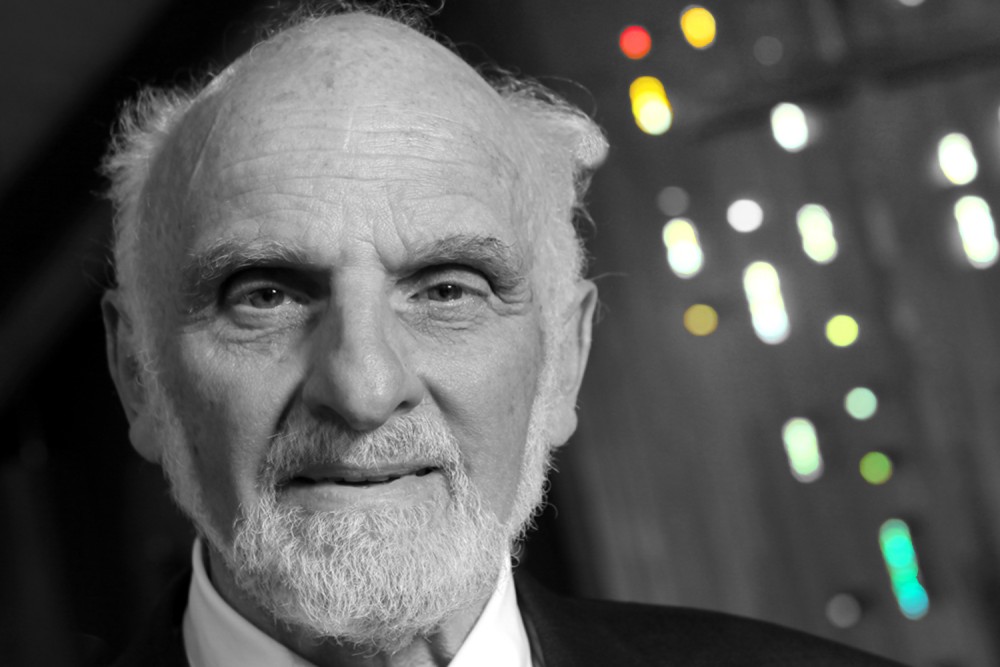Walter Brueggemann’s gift of disruption
In his hands, the Bible was a living, aching, burning thing.

Walter brueggemann has died, and I can already feel the silence he leaves behind. Not the peaceful kind of silence, but the kind that follows a thunderclap—or the pop and sizzle of a transformer blowing out in the dark. The kind that rings in your ears.
He may not have been a household name—depending, of course, on the household—but for those of us who have stood behind pulpits, wrestled with ancient texts, and tried to name something true in the tension between scripture and the world, his voice was a guiding force. His words have challenged us, comforted us, and more often than not, disrupted us. He called the church to speak boldly—not to protect itself, but to offer an alternative vision grounded in justice, mercy, and hope.
Read our latest issue or browse back issues.
Brueggemann was born in 1933 in Tilden, Nebraska, the son of a German Evangelical pastor and a church musician. He earned his BA from Elmhurst College and went on to study at Eden Theological Seminary and at Union Theological Seminary in New York, where he completed his doctorate in Old Testament. Ordained in the United Church of Christ, he taught for many years at Eden before joining Columbia Theological Seminary in Georgia, where he taught Old Testament until his retirement. Though he published prolifically and lectured widely, his voice never lost the cadence of a preacher shaped by the prophets he studied.
Brueggemann was not interested in easy answers or sanitized interpretations. He wrote, “The task of prophetic ministry is to nurture, nourish, and evoke a consciousness and perception alternative to the consciousness and perception of the dominant culture.” He did not ask the biblical text to be safe; he asked it to speak. And when it did, he stayed. And so he illuminated for us the wild terrain of the prophets. The aching honesty of the Psalms. The fierce poetry of a God who delivers slaves and dismantles empires. He reminded us that the Bible is not a flat text but a living witness full of contradiction, beauty, and generative tension; not a book of certainties but a collection of testimonies, laments, and hopes. He showed us how to love a book full of arguments and angels, blood and bread, where prophets weep and poets pray with dirt still on their hands.
Brueggemann’s writing was prolific but never mechanical. His words pulse with urgency, even when delivered with academic precision. In The Prophetic Imagination (1978), he frames the work of the prophet as that of imaginative disruption, creating a vision of reality in which grief is not privatized and hope is not managed. That book alone has reframed the work of ministry for multiple generations of preachers.
Though The Prophetic Imagination became his signature work, Brueggemann’s output is astonishing in its breadth. He authored more than 100 books and hundreds of articles, ranging across biblical commentary, homiletics, theology, and spiritual formation. From his poetic reflections in Awed to Heaven, Rooted in Earth (2002) to his political and economic critiques in Truth Speaks to Power (2013), he shaped the theological imagination of mainline Protestants, progressive evangelicals, and seminarians across traditions. His Texts for Preaching series (1993–1995) became a lifeline for many lectionary preachers, while Sabbath as Resistance (2014) invited Christians to reclaim rest as a form of defiance in a culture of productivity.
What Eugene Peterson did for the pastoral imagination, Brueggemann did for the prophetic one. He gave voice to what many of us felt in our bones but couldn’t yet name: the dissonance between the kingdom we were preaching and the systems we were serving. He didn’t fix the world, but he showed us where to stand when it breaks. And he did not flinch from naming where we had compromised. He saw Pharaoh everywhere—in politics, in consumerism, in pulpits that traded conviction for comfort. And still, he loved the church—fiercely, restlessly, hopefully.
His influence extended far beyond academia. His teachings resonated in seminary classrooms, church basements, and coffee shops. He had a unique ability to bridge the gap between scholarly exegesis and pastoral application. His interpretations of scripture were never ornamental. He saw the Psalms as a collection of not private devotionals but public testimony—what he called “speech-events,” or moments when truth telling breaks through despair. In The Message of the Psalms (1984), he categorized each psalm by its sense of movement: orientation, disorientation, or reorientation (or new orientation). This framework gave language to readers walking through seasons when God felt absent or suffering seemed endless.
In a 2008 interview with Working Preacher, Brueggemann emphasized the importance of imagination in preaching—and then added, “If imagination is the key to good preaching, you cannot be imaginative when you’re exhausted.” He urged pastors to make time for study, prayer, and rest, recognizing that these disciplines fuel the imagination necessary for prophetic proclamation.
His commitment to the church was never abstract. He believed the church’s vocation was to offer a counternarrative to the prevailing culture—challenging systems of oppression, resisting co-option, and imagining the alternative community envisioned by the prophets.
Not all of Brueggemann’s work was received without controversy. His 2015 book Chosen? Reading the Bible Amid the Israeli-Palestinian Conflict drew both criticism and praise. In it, he challenged prevailing theological assumptions about divine election and land, offering a biblical critique of how scripture is sometimes used to justify modern political policies in Israel. Some accused him of imbalance or even anti-Jewish sentiment. Others saw the book as a courageous act of faithfulness—an extension of his lifelong commitment to asking unsettling questions about power, justice, and belonging.
As a pastor, I have felt the weight of Brueggemann’s insights. His words have stirred my sermons, challenged my assumptions, and deepened my understanding of scripture. While I never met him personally, his influence has been profound. Again and again, he taught me that faithful speech often begins in silence—and that sometimes disruption is the most faithful act of love.
In recent years, Brueggemann quietly stepped back from public life as his health declined. And yet, even as his body weakened, his witness did not. He continued rising each day, still going to his office to write. He kept naming the griefs we hadn’t faced. He kept trusting the Spirit to say something new.
That, in itself, is a kind of prophecy. Not the thunder, but the fidelity. Not the headlines, but the long, slow obedience to a vision of the world reshaped by divine imagination. A prophet, he wrote, “does not ask if the vision can be implemented, for questions of implementation are of no consequence until the vision can be imagined.” That vision came alive in his work—and continues to echo in ours, reminding us that the prophets are not gone. They’re scattered like seed in every place we thought was barren.
For pastors, Brueggemann was both companion and challenger. For students, a translator of complexity. For the church, a sacred irritant. And for the rest of us—trying to preach and pray our way through contradiction and beauty—he was a reminder that scripture can still surprise us, still disturb us, still set us free.
Walter Brueggemann has died, but his disruption remains—a poetic, unmanageable, holy disruption that still whispers to those with ears to hear and hearts brave enough to respond. He did not ask us to copy his voice. He dared us to find our own. He gave us permission to trust that the word is still alive—and that maybe, somehow, so are we.





